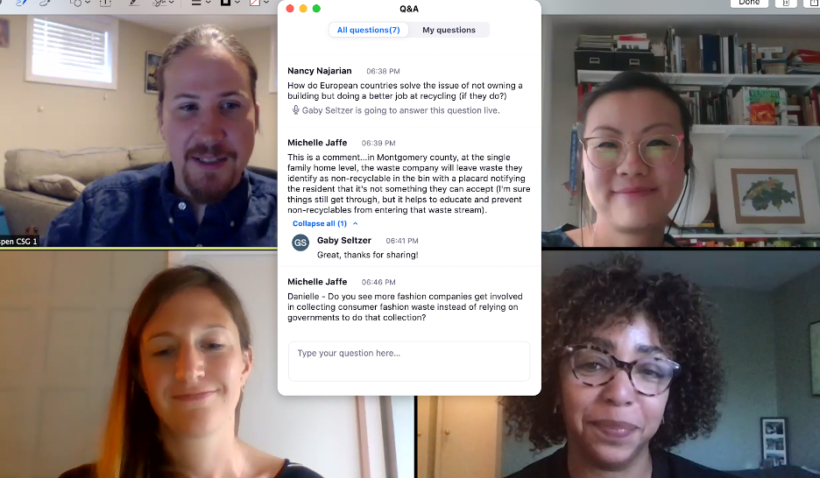
By Jess Parker
On June 24th, 68 guests attended a virtual discussion hosted by Leaders in Energy Circular Economy Working Group, DC EcoWomen, and the Aspen Institute Green Team that featured three professionals paving the way toward a circular economy in their fields. The panel addressed how they have incorporated circular economy principles in the workplace through specific programs and initiatives.
The panelists included:
- Danielle Nkojo – Manager, Global Sustainable Products at Kontoor Brands and the Circular Economy Club Washington, DC Coordinator
- Stephanie Potter – Executive Director of the Sustainability and Circular Economy Program at the U.S. Chamber of Commerce Foundation’s Corporate Citizenship Center
- Shengyin Xu – Global Sustainability Manager at World Resources Institute (WRI)
The panel was moderated by Clifford Deaton, the Co-Chair of the Aspen Institute Green Team. He began the conversation by defining “circular economy” as “a sustainability framework that aims to design out waste and pollution, keep products and materials in use, and regenerate natural systems.” Although many professionals are working from home due to the coronavirus pandemic, Deaton recognized the potential to implement circular economy initiatives at the office and employees’ role to help organizations make internal shifts that result in a transformative groundswell to bring about change.
A Passionate Citizenry in DC on Zero Waste and Sustainability
Nkojo started by highlighting the fact that there is a passionate citizenry in DC that is motivated to improve their workplaces and communities for the better. She pointed to the grassroots work of the Circular Economy Working Group as evidence of the support and energy behind a circular economy in the city across various sectors. During her tenure as a Sustainability Analyst at the DC Department of Energy & Environment, Nkojo helped to advance the Sustainable DC initiative, which launched a 20-year plan to make DC the healthiest, greenest, and most sustainable city in the nation through 167 individual actions. Part of her work on Sustainable DC included leading the waste working group, which brought together a diverse coalition to contribute to the waste section of the plan. Nkojo also spearheaded the Department’s addition of composting practices in its workplace, noting that the Department had to lead by example in its efforts to move the city to zero waste. She discussed the unique challenge of implementing composting services when the building is owned by another entity and the need for open channels of communication and buy-in when pursuing new programs. Xu also commented on using the time of re-signing a lease as an opportunity to work with the building management to push forward sustainability and circular economy programs and initiatives, such as LEED certification, green cleaning programs, and composting pilots.
Circular Economy Making Sense for Businesses
Potter addressed the status of the circular economy in the corporate space, underscoring that the US Chamber of Commerce Foundation has spent the past eight years educating and socializing their partners on the concept. She emphasized that the circular economy makes sense from a business perspective, and overall corporations have been very receptive to adopting circular economy principles. The Foundation’s focus has recently shifted from promoting the concept to advancing practical tactics that companies can implement across supply chains and methodologies for collecting and tracking data. Potter highlighted the Foundation’s role as an aggregator of information and resources to drive change within the private sector and was encouraged by the level of interest in circular economy principles from corporations. Potter also spoke to the power of multinationals and municipalities teaming up in working groups to tackle common problems through place-based regional approaches, such as the Beyond 34 initiative that aims to increase the current 34% recycling rate in the US.
Advancing the Circular Economy in the Organization and Working at Home
Xu continued the discussion with an overview of the WRI sustainability team’s initiatives to develop internal systems and tools that advance the circular economy and sustainability principles within the environmental organization. To begin, WRI conducted a GHG inventory of its operations and set science-based targets for emissions reductions by 2020. Xu reported the organization is proud to have met one of its three targets despite experiencing 3-4 times growth, citing a 50% reduction in emissions from electricity in the last nine years. She discussed the importance of engaging staff around these initiatives and being able to tell a persuasive data story. Her team is launching a digital platform for sustainability reporting that will use an interactive format to present the data in a digestible way. Their hope is to make GHG reporting more accessible to a larger audience beyond WRI. Additional communications such as a WRI newsletter and emails to staff also promote circular economy principles and increase the visibility of the sustainability team’s efforts. Now that the WRI staff is working from home, they have shifted their focus from office initiatives to addressing individual environmental footprints at home. For example, they have launched an awareness-building program to bring attention to the environmental and health impacts of using certain cleaning products. Xu also commented on using staff rewards such as a bike-share credit and zero waste kits, cautioning against their overuse since the ultimate goal is for staff to participate in sustainability practices for the sake of doing the right thing, not financial gain.
Making CE Principles Easy and Simple
Both Potter and Xu discussed the effectiveness of waste audits in the workplace and their role in educating staff about recycling programs and contamination issues. At WRI, Xu recounted that a waste audit revealed that recycling contamination was a major problem for the organization and additional education efforts were needed to rectify the problem. She recommended a quarterly waste audit with staff to collect data and to leverage the activity as a learning moment. Potter also suggested visiting a waste materials recycling center with staff as an education tool. Nkojo pointed out that high recycling contamination rates can lead to entire loads being disposed of as trash so organizations must do a better job of communicating with staff about what is and is not recyclable.
In thinking about ways to integrate circular economy practices in a workplace that isn’t particularly green, Xu offered that you need to understand your audience in order to effect change. What are the barriers to action? What keeps people from properly sorting their waste? For the best results, you want to make it as easy and simple as possible for people to participate. Nkojo added that it helps to add an element of fun into the conversation. Nkojo pointed to the success of her Rethread initiative, which motivated and mobilized people to recycle their textiles. Working with partners such as DC GoodWill, she made upcycling clothes enjoyable and created an opportunity for people to reimagine the lifecycle of their things. She encouraged utilizing opportunities such as workplace lunch-and-learns and volunteerism as tools from inspiring a circular economy culture. Potter also pointed to the range of opportunities to engage staff on circular economy topics as these concepts bleed into everything from the sharing economy to project garages to ride-sharing apps.
For employees who want to communicate circular economy principles to the C-suite, Potter advocated for pursuing support from the CFO or COO first as these individuals will ultimately decide if circular economy programs make financial sense for their organizations. She also commented on the power of employee buy-in at the grassroots level and encouraged a dual approach of seeking support from leadership as well as staff.
Other Cities Working in the Circular Economy
The panelists concluded by recommending the work of several cities leading the way in the circular economy space: Charlotte, North Carolina; Phoenix, Arizona; Orlando, Florida; Cincinnati, Ohio; and Amsterdam. As the panelists discussed, there are many opportunities for organizations to engage with this work. To get involved, join the Leaders in Energy Circular Economy Working Group for monthly happy hours designed to leave you with tangible tools on how to implement circular economy principles at your workplace.
For resources mentioned during the panel, see below. You can access a recording of the panel discussion here.
Resources
Ellen MacArthur Foundation
https://www.ellenmacarthurfoundation.org/
WRI Sustainability
https://www.wri.org/sustainability
Beyond 34: Recycling and Recovery for a New Economy
https://www.uschamberfoundation.org/beyond-34-recycling-and-recovery-new-economy
Zero Waste Omnibus Bill of 2019
https://lims.dccouncil.us/downloads/LIMS/43445/Introduction/B23-0506-Introduction.pdf
- Creates a Donation and Reuse Program including an exchange platform.
Circular Charlotte
https://envisioncharlotte.com/circular-charlotte/
Sustainable DC
https://www.sustainabledc.org/
DC Department of Public Works, Annual Waste Diversion Report
https://dpw.dc.gov/wastediversionreport
Jess Parker recently completed a Fulbright grant in Brazil and holds a B.A. in Environmental Studies and Geography from Middlebury College. After working in environmental education and the adventure travel industry for several years, she is currently exploring career opportunities at the intersection of food systems, the circular economy, and sustainability.



Leave a Reply